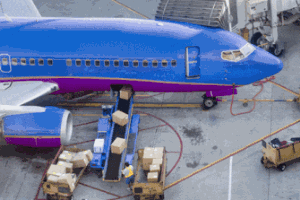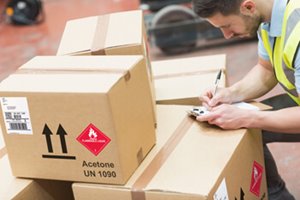Who Needs Hazmat Training in 2024?
The US Hazardous Materials Regulations (HMR) require shippers of hazmat (also called "dangerous goods") to provide training for all “hazmat employees.” To determine who needs hazmat training or re-training on your shipping team this year, start with these basic questions about what you do and how you do it.
Who affects hazardous materials transportation safety?
Businesses and other entities that offer hazardous materials for transportation by any mode—highway, rail, air, or vessel—must provide training for all employees in job roles that affect the safety of those shipments. In short, any employee who performs a job function regulated by the HMR must complete hazmat training described in 49 CFR Part 172, Subpart H (What should hazmat training cover?).

Job roles covered by the hazmat regulations include hands-on functions like filling and closing packagings, affixing labels or markings, creating or signing shipping documents, loading or unloading containers or vehicles, or operating vehicles or equipment used to transport hazmat.
Also covered by the HMR: Employees and decision-makers responsible for tasks like classifying a hazardous material, assigning an ID number or shipping name, selecting or purchasing hazmat packaging, offering/providing placards (when required), and overall logistics planning.
There are no exemptions to the training requirements provided for small businesses or self-employed individuals who ship hazmat as part of their job. Shippers must make sure that any person performing a regulated function on their behalf, like a contractor, has been fully trained before work begins as well.
Who has prior hazmat training?
In the US, shippers of hazmat by ground and/or vessel must provide training for all hazmat employees every three years (49 CFR 172.704; IMDG Code 1.3.1). Each employee involved in preparing or offering ground shipments must be prepared to perform their job role in full compliance with applicable regulations.
For ground shipments, that means the US DOT HMR. Ocean/vessel shippers must also provide training on unique, additional requirements imposed by the International Maritime Dangerous Goods Code (IMDG Code).

For shippers of hazmat by air, training for employees is required every two years by the IATA Dangerous Goods Regulations or DGR (IATA DGR 1.5). Most major air carriers are IATA members, who require compliance with the IATA DGR and do not accept packages not prepared according to those rules.
If you have employees that directly affect the shipment of hazardous materials by air who trained two calendar years before the current one, ensure that they are re-trained before their specific training date this year. If their two-year training anniversary has come and gone, put a pause on all of their air hazmat functions and train them as soon as possible.
If you have "hazmat employees" who needs re-training in 2024, make sure they are re-trained before the specific date this year. If an employee's two- or three-year training anniversary has passed, put a pause on all of their hazmat job functions and re-train them as soon as possible.
Who is new, and whose role changed?
New hazmat employees must receive initial training within 90 days of employment or job assignment, and may not work unsupervised until training is complete, per the HMR.
Shippers should regularly re-evaluate employees' job responsibilities to determine if the role has changed in a way that makes the employee a “hazmat employee.” If an untrained employee begins performing a task covered by the HMR, hazmat training must be provided in order for the employee to continue in that role.
Shippers must provide update training if and when a change in job duties requires it and/or when the 49 CFR hazmat regulations that affect the employees' job change.

Did the COVID-19 pandemic affect your training schedule?
US DOT’s Pipeline and Hazardous Materials Safety Administration issued several compliance and enforcement memos during the COVID-19 outbreak.
A March 25, 2020 memo communicated that hazmat inspectors would not “take enforcement action against any hazmat employer who is unable to provide recurrent training consistent with HMR training requirements.” PHMSA issued a similar notice affecting only maritime shippers on October 30, 2020. Both amnesty periods ended in 2020.
Any shippers or individual employees whose recurrent training schedule was affected by this amnesty period must now be back on a "regular" training schedule.
Lion DOT/49 CFR Hazmat Shipper Workshops
Join Lion for engaging, lively in-person training and develop the expertise you need to classify and name hazardous materials, package hazmat, mark and label packages, fill out shipping papers, and comply with DOT security plan and security training requirements for hazmat employees.
Find a Post
Recent Posts
Compliance Archives
Download Our Latest Whitepaper
Look beyond the annual "Top 10 List" to see specifics about the most cited OSHA health & safety Standards and the individual regulations that tripped up employers the most last year.
.jpg?ext=.jpg)
By submitting your phone number, you agree to receive recurring marketing and training text messages. Consent to receive text messages is not required for any purchases. Text STOP at any time to cancel. Message and data rates may apply. View our Terms & Conditions and Privacy Policy.
